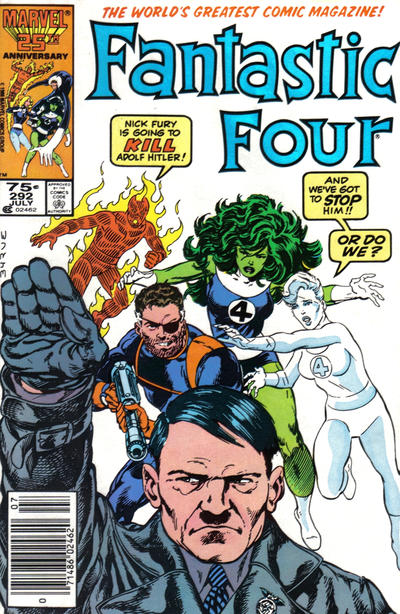| Posted: 19 July 2011 at 8:46am | IP Logged | 12
|
|
|
An Illustration:When I was gearin up on the INDIANNA JONES series to Marvel, one of the things I said would be fun about it was that, like the old serials the movie was based on, each issue could end with an impossible cliffhanger from which, at the beginning of the next issue, Indy would be shown making (or having made) a miraculous escape. All this was agreed to by all concerned -- until I actually started work on the series. Then Shooter did one of his characteristic 180s, and declared that every issue must be complete unto itself. There could, he said, be "cliffhangers" WITHIN each issue -- basically, "turn the page" cliffhangers -- but each issue must tell a whole story. Denny O'Neil, the editor, and I, were able to fight that one on the grounds that the cliffhanger endings had already been agreed to, but this was an all-too-typical example. Shooter's insistence that he had no "rules" is patently absurd, as anyone who worked at Marvel at the time will testify. It is true that when he started in an editorial position at Marvel, one of his mantras was that the only "rule" was "Good Stories", and he would often say there were no set and defining "rules" for what made good stories. That didn't last long, however. I well remember him telling me of how one particular writer had come into his office one day, complaining that every issue had to have a fight scene. This writer objected to having to basically derail his storyline for a few pages of pointless punching and hitting. Shooter told me that, as the hero of his own life, he'd told the writer that a story didn't have to have a fight scene, but it did have to have CONFLICT. This he defined as something the protagonist would have to overcome in order to resolve the main situation of the story. Sometimes conflict did, indeed, take a literal form, as a fight scene. But it didn't have to. Unfortunately, that didn't last long either, and old timers at Marvel will moan as they tell how Shooter's definition of "conflict" grew more and more narrow until there was only ONE form that was acceptable. The one he defined as "I must, but I must not!" That became the ONLY "conflict" that was acceptable, and writers began jumping thru the most amazing and ridiculous hoops to try to force that particular kind of "conflict" into EVERY STORY. A particularly ridiculous example of this is here presented for all the world to see, on the cover of FANTASTIC FOUR 292: 
I wrote the cope for that cover, and (foolishly?) thought that the FF finding themselves in a situation where they actually had to SAVE Hitler would be "conflict" enough. But the editor, fearful of Shooter's interference, added a balloon to my script -- "OR DO WE?" -- thus creating one of the most awkward and unnatural passages of dialog to have appeared on a cover in a long, long time. Yeah, Shooter had no "rules".
|





